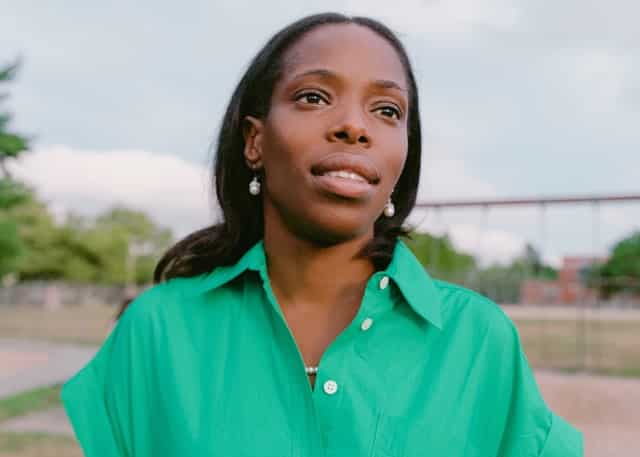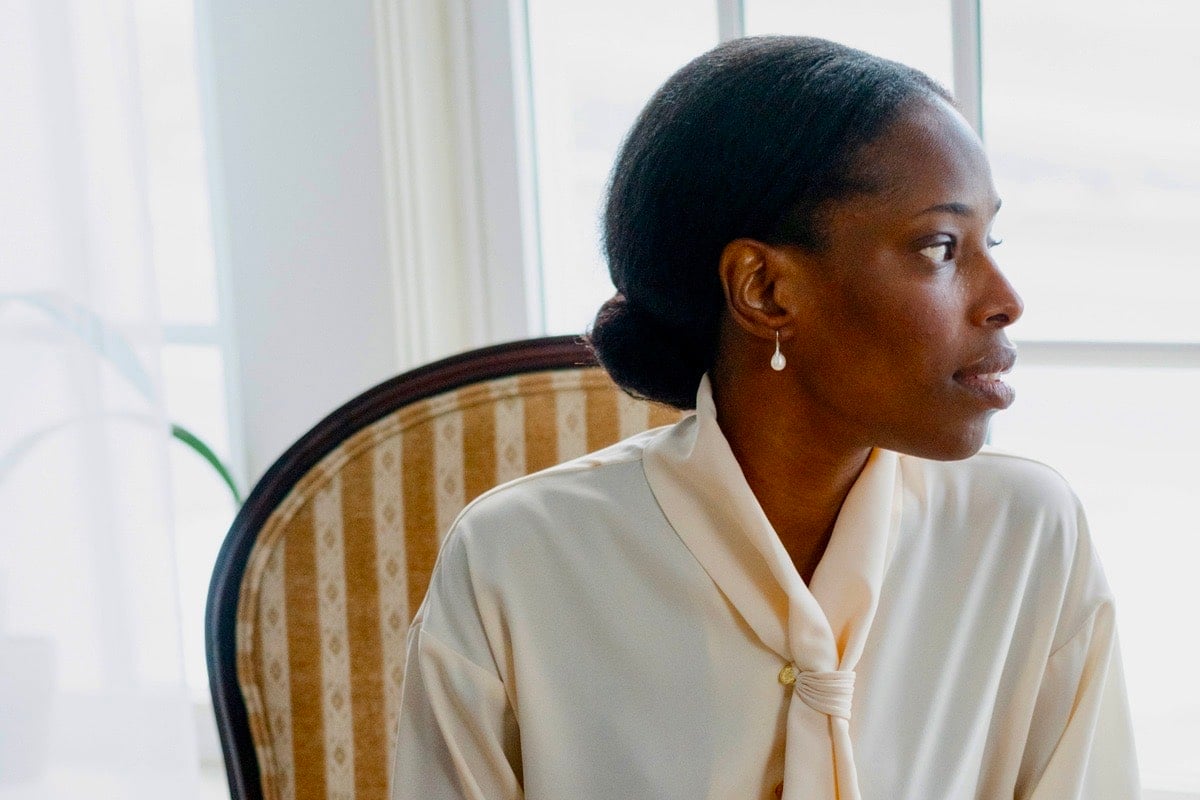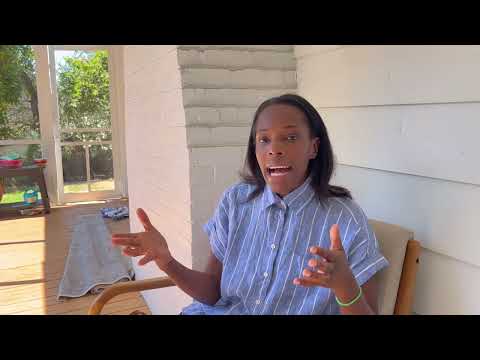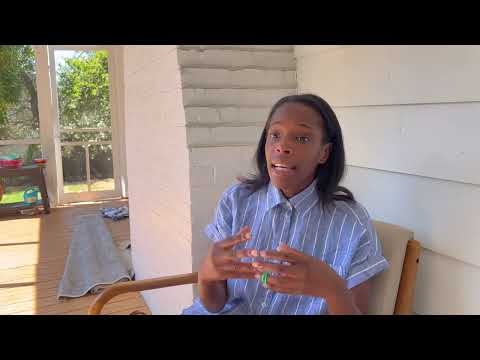Secretary of State candidate Stephanie Beauté seeks to bring innovation and forward thinking to the office
“We want someone who is young. We want new, fresh ideas. We’re always hearing about that. And now you have a new, fresh idea, a new, fresh perspective from someone who’s not only youthful, but who is excited, who wants to deliver technical solutions to make your life easier. I am not interested in supporting Republican politics or Democratic politics. The only thing that I’m interested in is making sure that there’s integrity in our elections, that the tools work when they’re supposed to work and how they’re supposed to work regardless of how you vote.”
August 20, 2022, 10:33 am
By Steve Ahlquist
Stephanie Beauté is running in the upcoming Democratic Primary for Rhode Island’s open Secretary of State seat. Nellie Gorbea, who currently holds the seat, is term limited and running for Governor. Beauté’s opponents in the race are State Representative Gregg Amore (Democrat, District 65, East Providence) and Republican Pat Cortellessa.
Beauté works in tech, is a mom to a four-year old, and is running a grass roots, upstart campaign. She is challenging the notion that Gregg Amore is the anointed heir to the Secretary of State’s throne even as she faces challenges being taken seriously by the mainstream press. Beauté told Uprise RI that the Amore campaign was uninterested in engaging in a public forum or debate, something Representative Amore disputes.
“I’m eager to debate,” said Representative Amore. “I’d like to debate.” Representative Amore suggested Uprise RI moderate the debate. [Details on an Uprise RI sponsored debate are pending as we pull one together. Also, we’ll be doing an interview with Representative Amore soon.]
In our brief conversation with Stephanie Beauté Uprise RI learned that at the heart of an underfunded and understaffed campaign there is a serious and talented candidate. This interview was conducted Friday morning on Stephanie Beauté’s porch in Smithfield. The written portion of the interview has been edited for clarity.

Uprise RI: Can you tell me a little about yourself and your experience?
Stephanie Beauté: Sure. My name is Stephanie Beauté. I was born in Brooklyn, New York. I’m the eldest of four. We moved to Rhode Island around the age I was in middle school. I went to Gilbert Stuart for middle school and then graduated from Hope High School. I’m a proud Hope alumni. I went to URI, a proud TD scholar. I worked for a number of years in the social services area. I worked at United Cerebral Palsy (UCP), worked at Life Incorporated for a bit, and I also worked with Trudeau. During that time, I worked for people with social developmental disabilities writing grants, working as a support coordinator, and creating successful metrics and tools for the folks that we supported.
After doing that for some time, I wanted to do something a little bit more challenging. UCP wrote an excellent recommendation letter for me. I decided to pursue IT as the course of action that would revitalize and invigorate my intellect. I worked as an IT intern for the state for a few months under then treasurer Frank Caprio. I did that for two semesters which was fun and cool. That [experience] solidified that this was in fact the place I wanted to be. I got my master’s in information systems. I worked for a software company in Boston for some time until GE poached me. I worked at GE digital, which was then acquired by GE corporate. I was at GE for a number of years until COVID and then I got laid off. I now work for a software company in Boston. I work as the Program Manager for the integration and ecosystem management team.
Uprise RI: Why are you interested in being the next Secretary of State?
Stephanie Beauté: I was watching the Rhode Island elections and seeing who was coming forth as candidates, which was exciting, but there wasn’t a person that met the expertise [required to be Secretary of State], especially considering what we’ve learned after the January 6th incident, which did not sit well with me and I’m sure with a lot of Americans as well. [I was concerned] about how polarizing the last election cycle was for a number of different reasons. As we enter this current election, which will set precedent for the next presidential election, I thought it was critical to have someone who had both the IT knowledge and expertise to be as transparent and direct as necessary, and strong in those regards.
I did not see a candidate that met any of those requirements. So I waited and I literally announced at the last second you’re allowed to officially announce your candidacy. Many people were like, “I wish you had announced earlier.” But I had no desire. I’m not a politician or excited about politics. What I am excited about is folks that are there to provide solutions to the day-to-day needs of Americans. That is what stuck out to me. As Rhode Island enters into the next election cycle, do we have someone in place that is well equipped, well versed with technology, who is open to and flexible with the needs of software? Because whenever you’re releasing software, there’s a two week cycle and then testing, right? How are we embedded in our QA system? Do we have enough conversations with the Board of Elections? What does that relationship looks like? There’s so many different elements that stick out as pain points and I did not feel, unfortunately, that there was a candidate able to fit that spot.
Uprise RI: What you’re talking about here is a level of expertise that you don’t see among the other candidates, but there’s also this idea about election integrity. How do you think the current Secretary of State, Nellie Gorbea, has done in that position? How do you feel about Rhode Island’s performance in recent elections?
Stephanie Beauté: Great question. I think Nellie has done a great job given the circumstances that she faced. It was an uphill battle for her. As with any type of uphill battle, you are met with hard challenges and a lot of pushback. You can only do so much. There hasn’t been, as we’ve seen in other states like Georgia, this huge uproar over election integrity, which means that the people of Rhode Island are very different from the people who live in Georgia. That does not necessarily mean that Secreatry Gorbea did bad or good. It just means that we as Rhode Island residents are a very different group [of voters] and that the work that Secretary Gorbea has done has met that requirement for us at this point in time.
As we look into the future and where technology is going and what we need to be prepared for… folks who are on opposite sides of the aisle talk about the Chinese and the hack of [democracy]. How do we resolve that polarization? That’s where we bring in a level of confidence and ensure that we have taken all the steps that are necessary to ensure that our democracy is safe, that our elections are safe, that folks who are U.S. Citizens can vote, that we’re not creating barriers, and we’re removing misinformation. That itself can be polarizing, when folks are genuinely confused by misinformation. We need to be transparent, to a degree, in the work we do in terms of our software integrity, making sure that the tools that we’re using are up to date, that we’re bringing outside experts to come in and monitor that, and that we’re letting the public know, informing folks to make sure that information is disseminated in a way that is honest.
Uprise RI: So my brain went in about five different directions as you spoke. I have bunch of questions to springboard off what you said. The General Assembly recently passed the Let Rhode Island Vote Act*. You are probably aware of all that. Is there more legislation that you’d like to see happen?

Stephanie Beauté: One thing that is part of my plan is that we register folks to vote early. And by that, I mean students who are in high school. If you’re 16, 17, we pre-register you to vote. So that way when you turn 18, you’re already registered. That resolves, in my opinion, the concern of folks who are on the other side of the aisle who don’t think that voting is safe, who think that people are going to show up at the polls pretending to be someone they’re not and registering to vote. We are resolving that pain point for the other side of the aisle.
One way I like to distinguish myself is that I’m focused on processes and people and not on politics. I want to make sure that I have great resources for informing kids. Some schools do backpack giveaways. We’re informing them about how to register to vote. We get into the schools and get folks preregistered. They’re learning about their right to vote and how to be more civically engaged. And on their 18th birthday it’s one thing that they don’t have to remember. I think that is something we could do from a legislation standpoint that both sides of the aisle would agree on.
Uprise RI: Central Falls had a great participatory budgeting process in the high school. The first one they did was a few years ago. What they did was they had students vote on how they want to spend grant money they had recently been given. They had a bunch of choices and they had posters up and kids were advocating for different plans and different uses of the money. Do you want to bring in somebody for a concert or do you want to redo the library? They were doing this with actual voting machines which are normally in storage, with the help of the Secretary of State. It taught kids about how to use the voting machines and about the importance of budgeting and democracy – direct democracy.
Stephanie Beauté: The more that you do to inform students and educate the population, the more well equipped people will be. You’ll see how more engaged people actually are. And we’re not that different to be honest.
Uprise RI: Not different in what way?
Stephanie Beauté: We as people We have the same ideologies. We want everyone to be successful. We want everyone to be happy. We want to be able to live life with dignity and respect. Our ideas aren’t that different. It’s how do we get to that place, the end goal, that’s the hard part. Teaching people how to vote, being able to debate and have healthy discussions. Being engaged and then seeing the outcome.
Uprise RI: So part of your, I don’t know what to call it, your ideology, is that you want to preserve and enhance democracy itself, and ensure the franchise to the people that it belongs to.
Stephanie Beauté: That is correct.
Uprise RI: What other functions, beyond just running elections, do you see the Secretary of State doing?
Stephanie Beauté: One of the areas where I think that we could do a better job is with small businesses. One of my areas of concern is is that it’s too arduous a process for folks who are new to business. And for the folks who have already been incorporated, they have expressed how frustrating the process is. So how do we create a system that serves as a tool so that folks can come to the Secretary of State’s office to either have support in terms of some financial resources that are available as recommendations or guidelines, or, if a business isn’t necessarily the best with budgeting, helping to find some available accountants. Also, when you register a business, here is the checklist items that you need to do to ensure that your business stays open and that you are successful.
I think that we could create a better process. Like, you log on via your mobile app, this is just as an idea, you click, “I want to start a small business.” Great. Are you registered as an LSC? I didn’t know that. It prompted me. That’s something that I need to do. I check that off. I’ve uploaded that information, check. I’ve done that. Have you made sure that you’ve got an EIN number? Wait, I didn’t know I needed that. All of those different steps that we can make so simple that it would be intuitive for someone who’s not necessarily as technically proficient and someone who also may not necessarily have the expertise for opening a business.
You’ve done this great, check. It now takes you to the next step, right? Let’s say there’s a list of 12 items, just for the sake of discussion. As you meet one, it checks it off, then it tells you about the next bit. Then at the end it says “Make sure that you go to the Division of Taxation,” because I don’t believe that the Secretary of State’s office and the Division of Taxation are communicating as effectively as they should be. We want to inform businesses of that online, instead of them getting a random piece of mail. Some folks don’t go through their mail as much. Or, you go to close your business and then realize, holy crap, I owe all of this money to the Rhode Island Division of Taxation! No one informed me. How come I wasn’t made aware? I want us to be a place where we keep businesses open by being supportive of businesses. In my opinion, small businesses are truly the backbone of the Rhode Island economy and if we’re not doing our due diligence in that space to keep those businesses open, we’re doing a disservice to our community.
Uprise RI: I think, too often, we concentrate on bringing outside businesses to Rhode Island instead of developing the business ideas we have here.
Stephanie Beauté: I totally agree.
Uprise RI: When the state deicides it has millions of dollars to generate businesses, they give it all to, I don’t know, a soccer stadium, instead of giving $1 million to a bunch of different businesses to blossom the economy.
Stephanie Beauté: Agreed. And one of the things which is very hard to wrap my mind around is how a state like Massachusetts, which is our neighbor, is so successful at creating startups, so successful at having creative, innovative folks – young and old alike – be successful in that space. We’re not doing that here and I think that we need to change that. We’re not investing in the intellect that we have here in Rhode Island where we have one of the best Ivy League schools. We’re literally allowing folks who have this wealth of knowledge to leave this state. They’re not attracted to stay. They’re not seeing that there is truly a space for a small business for someone who’s a junior in college. If you think about Facebook, it was started in college, right. Let’s be real. We have young minds, brilliant minds, and creative minds at RISD, URI, RIC, and Bryant, great minds across the board in Rhode Island that have so many collective ideas, but not enough resources and support to not only build a company, but to be able to maintain it and then scale up. People are leaving. They’re going to Silicon Valley. They’re going to Texas, which is becoming a new boom for technology. Why aren’t we doing that here? We need to take a step back and look at how we can use that space to be more effective to our community here in Rhode Island.
Uprise RI: I think about some of the boondoggles we’ve had here in Rhode Island. We went to a New York advertising company and they developed the “Cooler and Warmer” advertising campaign for Rhode Island. Everybody thought was ridiculous and hated it. But right here, in Rhode Island, we have creative people. We have groups that could have done a better job.
Stephanie Beauté: I thought it was super silly. I have a person for that job, honestly. There’s so many creative minds here in Rhode Island.
Uprise RI: That’s what I’m saying. Why would we go to New York for ideas? Why don’t people come to Rhode Island for ideas like that?
Stephanie Beauté: We’re not doing enough to invest in our Rhode Island residents. And that for me is a concern because it means that we don’t feel confident in our Rhode Island residents to generate Rhode Island’s economy and that’s super silly to me.
Uprise RI: I’m not a super technical guy, but I know there are ideas out there about ensuring voting integrity using things similar to what is used for cryptocurrency. There’s various new ideas on how to keep our computers safe and our voting safe. Do you think the Secretary of State would have a role evaluating that stuff as it comes up and to think about how we move to the future where voting might be be literally me voting on my cell phone in a way that’s secure, that is not going to be broken and that I can have faith in the idea that the election is going to be fair and accountable and all that?
Stephanie Beauté: I think we have the potential to do so much more than what you mentioned there. One of the concerns with the email verification systems is that folks don’t necessarily use email, right? If that is the method we use, you might have a select group of folks that are comfortable with their laptops who log on and you might have some select groups of folks, like my mom, that have no idea how to use that. How do we mitigate for the entire population to be able to use a tool that we believe will function securely?
One thing that I would like to propose is something like two factor authentication. I’m sure you’re familiar. If you’ve ever entered your information online for banking, for instance, there would be either a six digit code or four digit pin that comes to you. That’s something that, whether you’re familiar with tech or not, you’d be able to understand. There’s so many different ways we can use technology to our benefit. We don’t want to pigeonhole ourselves by saying that we were so cyber proficient in that area but then we lost track of the other folks, the other demographic who may not necessarily be as technically proficient. They are voters as well.
Uprise RI: That’s another part of my question. In Rhode Island we have a form of a Voter ID, and we know that it does, in fact, make it so that some people cannot participate in elections. People who are homeless have a hard time verifying their address. We know that a certain segment of the population, usually people who have less money and are members of BIPOC communities, are unable to easily vote. Therefore they don’t even want to try to vote because of a process of going into a polling place and being embarrassed when you can’t verify your address. What do we do to ensure that everybody is counted, that everybody who wants to vote and is legally entitled to vote has the option to vote and how do we encourage people who might not know they want to vote to vote? Because the people who have the least probably need the most representation.
Stephanie Beauté: I agree. Their voices are being discounted and I think that the Voter ID law is a way to ensure that. We can see from history all of the steps that were taken [to disenfranchise voters]. In order to be able to vote you had to take a test, but that only affected a certain group of folks. I would like us to learn from the lessons of the past. For the communities that don’t necessarily have an address, how do we keep them in loop? The Secretary of State’s office can serve as a liaison with those nonprofits that are providing supports to those folks. I would like to learn about how we can make sure that we’re targeting and reaching out to the groups that are left behind. I think that the legislature can be out of touch because they’re not homeless. They have a more comfortable life in every respect. We could do a little more due diligence by having community liaisons where we’re talking to people and not just creating laws.
I’m a proponent of being in that space, to understand what that pain point is, rather than some politician just deciding that this is how we’re going to do it while not connecting with that community. Although the Secretary of State doesn’t necessarily decide that, that would be a legislation that I would push to get funding for so we are doing more in this space. To talk to folks at Amos House and places like that, because you might have folks that are not necessarily homeless, but they are leaving an abusive home. They do not want their ex-partner, boyfriend, spouse, whatever, knowing where they live. That puts their life at jeopardy or they feel like they live in constant fear.
That is the worst feeling that someone would have to go through and to know that someone has that information on file or has a connection with someone to get that information or they have some contact within government to get that information. How can we be mindful of those unique circumstances and how can we make sure that we have a soul for these people? They still have the right to vote, so how can we be a community liaison to make sure that they also have access to voting and ensure that their rights, their privacy, is protected as well? Because some folks can’t necessarily get a no contact order.
Uprise RI: The General Assembly recently passed a law this last last session about keeping the addresses of domestic abuse victims confidential. [That bill was sponsored by Representative Amore and Senator Dawn Euer and signed into law by the Governor in June.]
UpriseRI: When it comes to being open to inquiries from the press, Gorbea’s Secretary of State’s office, especially in comparison to Governors Raimondo and McKee, has been amazing. When I have a question, the staff people in Secretary Gobea’s offices either answer it right away or they call me back within an hour or so with the information I need. What are your thoughts about maintaining or even improving that level of openness with reporters and the public?
Stephanie Beauté: Every new product or project I take on I always look at what’s working and what’s not. What’s working, we keep, what’s not, we look at how we can fix it and explore where those pain points are. When listening to folks in product management, we do a lot of customer discovery. So I want to hear from folks. “What are the pain points within the Secretary of State’s office?” And it makes no sense to change something that’s working well. If it’s working well, how can we make sure that we are meeting and or exceeding folks’ expectations? So if you’re having a wonderful experience, which I am so happy to hear, we want to make sure that we can continue to meet that expectation and how can we exceed that?
I would love to hear, if elected into this role, in what ways could we do a superb job. In what ways could we be a 10 for you. Because we might be an eight and for someone else we’re a six. We want to be able to meet those expectations for folks and exceed them where we can. And for those pain points, let’s talk about what we can do to strategize and how we can improve. One of the great things with having my background in software is that nothing is stagnant, this is not a waterfall type of mythology, which is where you just continue months on months on and see how it goes. We are literally pivoting, shifting and trying to improve iteration after iteration. And we deliver software every two weeks. We are trying to build highly successful tools.
How can we be highly successful in the Secretary of State’s office every two weeks? We’re doing a pulse check, making sure that our constituents are happy, making sure that the public feels that they have open access to us, that we don’t have long lines, and our web traffic’s not bogged down traffic when you get onto our website. We want to keep things open. When a person goes to start a business, how long does it take? That is something I would love to get data on before that that business becomes official. Does it take 30 days or does it take three months? How can we improve these areas and make sure we are not a bottlenecking, and we’re not creating more roadblocks and challenges for folks, but removing them so that the businesses and people can be successful.
Uprise RI: Another thing about the Secretary of State is that they also maintain the Open Meetings Portal. The enforcement of the Open Meetings Act falls to the Attorney General, but the portal where every government and quasi-government agency lists their open meetings is maintained by the Secretary of State. So open meetings and open government are part of the DNA of the office.
I want to pivot a little bit outside the role and responsibilities of the office and talk about the election and the campaign process. If I’m off base here, tell me, but I think you told me that you’ve been having a hard time getting press or getting the Rhode Island Democratic Party to take your campaign seriously. Also, you’re looking forward to comparing ideas and platforms in some kind of debate or forum?
Stephanie Beauté: I’ve heard only positive things about Mr. Amore, so I assume the conversation would be productive and interesting to say the least. I would like to be able to talk about our platforms and what we intend to bring to the office and allow the public to decide. I’m not sure if you’re aware, but you probably are, that we have to file financial reports and we have to list where our donors are coming from. When you look at the list of donors on Mr. Amore’s side, it honestly feels as if that he’s just backed by special interest groups. So do special interest groups have a stake in this election?
Uprise RI: You mentioned Amore’s fundraising and the special interest groups. How is your fundraising going and how are you doing getting your messaging out with your limited financial means?
Stephanie Beauté: As you know, I work a full time job. I’m also a mom. So during my, quote unquote spare time I go out to canvas, talking to folks. I’ve been so fortunate that everyone I’ve met and spoken to are not only excited about the candidacy, but they’re also concerned that there hasn’t been a debate. They’ve just said, “I don’t even know this guy, but I’ve seen his name around and clearly he’s getting funding behind him.”
As a grassroots campaign, I don’t feel comfortable asking for money from folks who are already struggling in these financially challenging times. Asking folks for money who don’t have it, so they can have a secure election and voting process, feels disheartening to me. That’s not a fair thing. I have not been moved in my conscience to ask anyone for a cent, but for folks who do have the means to contribute, who are excited to, I thank them for what they have given. I am hoping that those who have not gotten the message that there’s someone out there that is pushing a grassroots campaign, that they would please donate to my campaign and help spread the message, get folks informed that there is another candidate. She happens to be a mother, a woman, and she just happens to be a technical person.
And no, you won’t find legislation that I’ve written because I’m not a politician. No, you won’t find experience of me in the General Assembly. You won’t find that. What you will find is that when it comes to getting things done, I am very good at that. When it comes to being resourceful, I am very good at that. When it comes to changing and challenging the minds of stakeholders, I’m very effective in that space. And I am committed. For me to walk away from the job that I have is truly because this is so passionate to me. I am genuinely concerned about what our next election cycle is going to look like if we don’t have someone that understands the technology and the space that we are in. We cannot afford to have another polarizing election.
I’m not focused on who wins an election. I’m focused on the polarization that is being used to misinform folks and break down our communities. That itself is disenfranchising a lot of folks and we are doing ourselves a disservice. Me running is trying to fix that. And I can say on record, and anyone can quote me four years down the line, that I would literally come in as Secretary of State and make sure it’s fixed. And if someone better shows up the next cycle, they can have the job. I have no interest in being a career politician. I’m not going for governor, I’m not trying to make a name for myself. No, I love technology. I love fixing things and this is something that needs to be fixed. And I hope to earn the vote of folks and not only that, the respect of my constituents, if elected, so they will work hand in hand with me to make sure that our voting system is top notch.
Uprise RI: Is there anything you need to say, anything I should have asked?
Stephanie Beauté: Vote for Stephanie Beauté for Secretary of State. This is one of the opportunities we talk about. We want someone who is young. We want new, fresh ideas. We’re always hearing about that. And now you have a new, fresh idea, a new, fresh perspective from someone who’s not only youthful, but who is excited, who wants to deliver technical solutions to make your life easier. I am not interested in supporting Republican politics or Democratic politics. The only thing that I’m interested in is making sure that there’s integrity in our elections, that the tools work when they’re supposed to work and how they’re supposed to work regardless of how you vote. I’ll say it genuinely: I personally don’t care [about who you vote for.] I want to make sure that the outcome is, in fact, accurate.
Uprise RI: Thank you so much.
*The Let Rhode Island Vote Act (H7100A, S2007A) makes mail voting easier by allowing online mail ballot applications, and permitting any voter to use a mail ballot or an emergency mail ballot without needing an excuse for why they can’t visit their polling location on Election Day. It also drops the requirement that mail ballots be either signed by two witnesses or notarized. Instead, voters’ signatures will be verified using their registration records using a four-tiered verification process. The bill requires every municipality to maintain at least one drop box where voters can deposit their ballots securely through the close of polls on Election Day. Additionally, the act allows nursing home residents to opt in to automatically receive applications for mail ballots for every subsequent election.



















